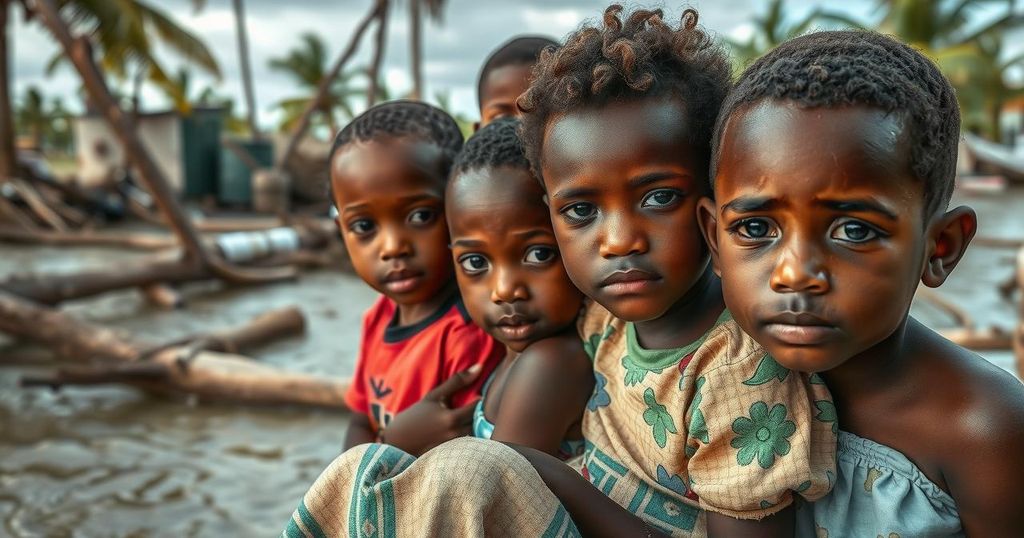Cyclone Chido Devastates Northern Mozambique, Impacting Thousands of Children
Cyclone Chido has struck northern Mozambique, displacing thousands and impacting around 90,000 children, with over 35,000 homes and 186,000 classrooms destroyed. The humanitarian response is in progress, emphasizing the urgency amidst ongoing conflicts and health crises in the region. Aid agencies are facing challenges in resource allocation to meet the needs of displaced families and combat worsening health issues.
Tropical Cyclone Chido has severely impacted northern Mozambique, particularly in Cabo Delgado province, leaving approximately 90,000 children affected. The storm, which struck over the weekend, resulted in extensive damage to infrastructure, with over 35,000 homes destroyed or damaged and 186,000 classrooms lost. The displaced communities now face heightened challenges in an area already under immense pressure from ongoing conflict and health crises. Efforts are underway by UNICEF and other agencies to provide humanitarian relief, yet the scale of need continues to grow due to limited resources and additional health threats, such as cholera outbreaks.
The recent cyclone casualties extend beyond immediate physical damages. It follows seven years of violent conflict in Cabo Delgado that has internally displaced over 1.3 million individuals, predominantly women and children. With the cyclone causing further hardship, many families are once again left without the means to rebuild. The World Health Organization (WHO) is actively engaged in health assessments in the affected regions to ensure that immediate medical needs are addressed, coinciding with rising food insecurity projections for the near future.
Emergency responses have commenced, focusing on delivering vital supplies such as blankets, sleeping mats, and other essential items for survival. However, a lack of sufficient supplies remains a significant hurdle. As per UN coordination offices, financial support has been allocated, yet the urgent need for humanitarian assistance is estimated at around 190,000 individuals in rural areas. The international community continues to monitor and respond to the evolving situation, aiming to alleviate the impact of Cyclone Chido and restore hope in the communities affected.
Cyclone Chido made landfall in Mozambique, causing widespread destruction in an already vulnerable region. The country’s struggles with climate change and ongoing conflict have compounded the crisis, leading to dire humanitarian needs. Children’s welfare is particularly at risk as they face the compounded effects of natural disasters, conflict, and health emergencies, necessitating coordinated relief efforts. Mozambique, especially Cabo Delgado, has become a focal point for humanitarian intervention, with multiple agencies devising strategies to address immediate and long-term challenges.
In summary, Cyclone Chido has resulted in significant devastation in northern Mozambique, particularly affecting children and displacing many families within Cabo Delgado province. The humanitarian response is currently underway, but challenges persist due to limited resources and pre-existing crises. The immediate and future needs for assistance are critical, highlighting the importance of collective efforts from various agencies to mitigate the impact of such natural disasters and support affected communities.
Original Source: news.un.org




Post Comment